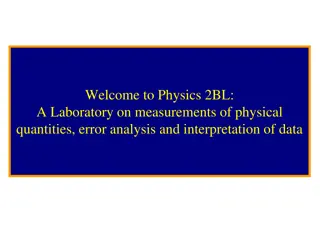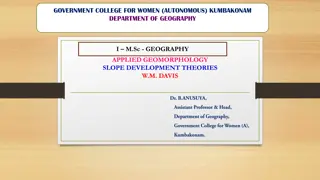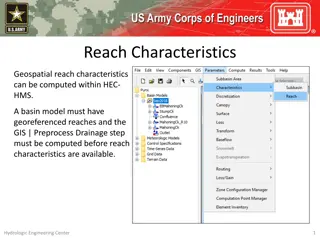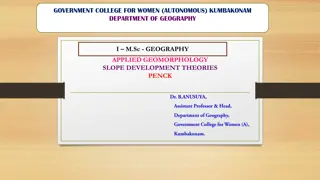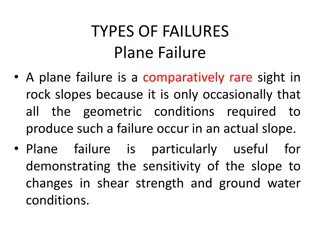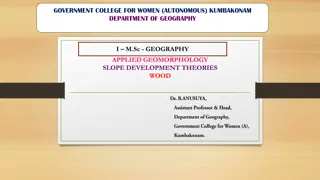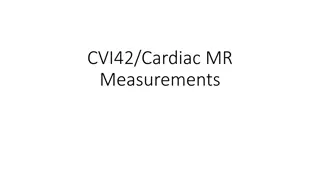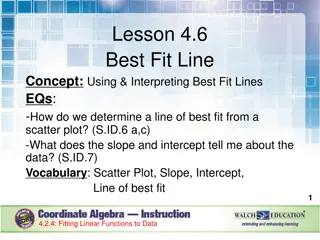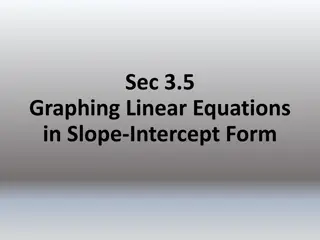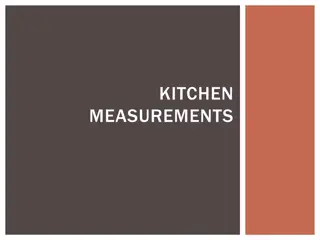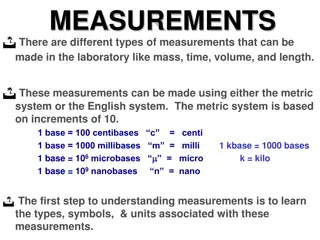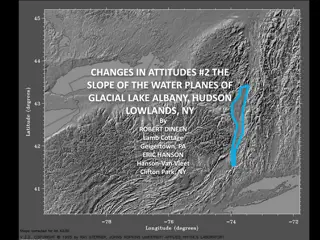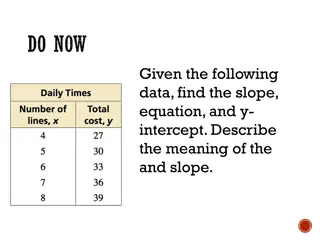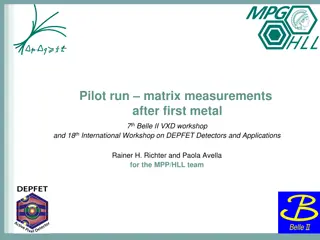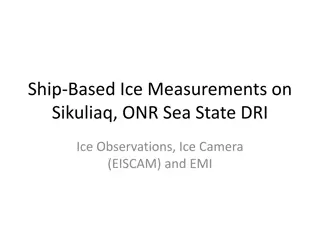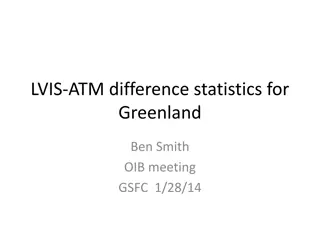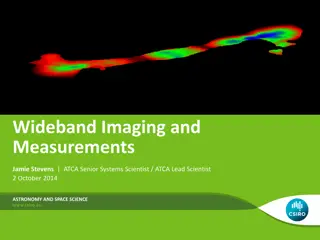Physics 2BL Laboratory: Measurements, Error Analysis & Data Interpretation
This Physics 2BL laboratory course focuses on measurements of physical quantities, error analysis, and interpretation of data. Students learn how scientists create models of natural phenomena and the practical aspects of conducting scientific experiments. Pre-requisites include Physics 2A, 4A or equ
0 views • 31 slides
If you are looking for Creative Activities in South Slope
If you are looking for Creative Activities in South Slope, Think Talk Create is a vibrant and inspiring creative learning studio dedicated to nurturing and empowering learners of all ages in Sunset Park, Brooklyn. We believe that education should be an engaging and enjoyable journey, and we are pas
0 views • 6 slides
Understanding Slope Development Theories in Geography - Department of Geography, Government College for Women, Kumbakonam
Slope development in geography is categorized into primary and secondary slopes, formed by processes that either promote or decrease relief. This involves erosion, weathering, and deposition processes, influenced by factors like lithology, climate, tectonic movements, and vegetation cover.
1 views • 27 slides
Understanding Reach Characteristics in HEC-HMS Basin Modeling
Reach characteristics play a crucial role in hydrological modeling using HEC-HMS. Georeferenced reaches are essential for computing reach characteristics like slope, sinuosity, relief, and more. The process involves pre-processing drainage data before detailed reach characteristics can be obtained.
0 views • 5 slides
Understanding Instrumentation and Process Control
This content discusses the importance of measurements in instrumentation and process control, outlining qualities of measurements, the main objectives of process instrumentation, applications of measurement systems, direct and indirect measurements, and functions of instruments such as transmitting,
1 views • 15 slides
Understanding Slope Development Theories by Walther Penck in Geomorphology
Explore the Slope Development Theories by Walther Penck in Geomorphology, focusing on concepts like Pendiplanation, Pedimentation, and the relation between endogenic and exogenic forces in shaping landscapes. Learn about the evolution of landforms and the criticism of the Davisian theory of Erosion
1 views • 28 slides
Understanding Slope, Gradient, and Intervisibility in Geography
Explore the concepts of slope, gradient, and intervisibility in geography through detailed descriptions and visual representations. Learn about positive, negative, zero, and undefined slopes, the calculation of gradient, and the significance of understanding these aspects in various engineering and
0 views • 12 slides
Understanding Plane Failures in Rock Slopes
Plane failures in rock slopes are rare but significant, indicating sensitivity to changes in shear strength and groundwater conditions. Geometrical conditions must be met for such failures to occur, including specific alignments and interactions between the sliding plane and slope face. Analysis inv
0 views • 22 slides
Evolution of Hill Slopes: Penck's Slope Replacement Theory
Penck's slope replacement theory proposes that the angle of a hill slope decreases as gentler slopes replace steeper ones, leading to the concavity of the slope profile. The model explains how vertical erosion by streams and denudation shape hillslopes, causing them to retreat in a parallel manner.
0 views • 9 slides
Understanding Ratios, Proportional Relationships, and Slope in Math
Explore the concepts of ratios, proportional relationships, constant rate of change, and slope in mathematics. Learn how to find constant rates of change from tables and graphs, calculate slope using points on a line, and understand direct variation between two quantities. Dive into examples to gras
0 views • 16 slides
Slope Development Theories in Applied Geomorphology
Slopes are formed through different processes as described by Wood's slope development theories, such as the Four Unit Slope Model and the 9-Unit Slope Model. These models illustrate various manifestations of slope profiles based on factors like rock composition and water movement. Different slope t
0 views • 10 slides
Cardiac MR Measurements Guide
This guide provides detailed instructions and images on how to measure various parameters in cardiac MR imaging, including left ventricle measurements in diastole and systole, LA measurements, aorta measurements, and EF calculations using CVI42 software. It also includes steps for phase calculations
0 views • 8 slides
Understanding Best Fit Lines in Data Analysis
Exploring the concept of best fit lines in data analysis, this lesson covers how to determine a line of best fit from a scatter plot, interpret the slope and intercept of the line, and fit linear functions to data points. Through examples and steps, students learn to graph data, find the equation of
1 views • 36 slides
Understanding Linear Equations and Graphs
Exploring linear equations in slope-intercept form, the concept of slope, graphing techniques, and real-world applications. Learn about positive and negative slopes, horizontal and vertical lines, slope-intercept form, and interpreting graphs. Examples guide you through finding slope, graphing lines
0 views • 8 slides
Estimation of Ionospheric Critical Plasma Frequencies Using GNSS Measurements
This research focuses on estimating the critical plasma frequency of the ionosphere, specifically the F2 layer (f0F2), using GNSS measurements. The study reviews past work on ionospheric modeling, discusses neural network training inputs, and presents a single station neural network model (NNT2F2).
0 views • 26 slides
Definition and Measurement Periods for RSTD in 3GPP TSG-RAN WG4 Meeting
In this document from the 3GPP TSG-RAN WG4 Meeting, the definition of intra/inter-frequency measurements, scenarios for RAN4 requirements, and measurement periods for RSTD are discussed. The focus is on requirements for RSTD and UE Rx-Tx time difference measurements. Various options and factors are
0 views • 19 slides
Importance of Measurements in Society
Measurements play a crucial role in society's proper functioning, involving units like ounces, pounds, inches, and cups for accuracy. Customary and metric systems are compared for distance, area, volume, weight, and temperature. Measuring equipment like liquid measuring cups ensures precise measurem
0 views • 24 slides
Neutrino Interactions with Liquid Argon at DUNE Near Detector Complex
The Deep Underground Neutrino Experiment (DUNE) aims to study neutrino oscillations using high-precision measurements with detectors like the Near Detector complex located downstream of the neutrino beam. Components such as ND-LAr and SAND play crucial roles in scanning energy spectra. SAND, a perma
0 views • 16 slides
Safely Logging Password-Derived Measurements for Web Login Systems
Design a secure measurement framework called Gossamer to assess risks associated with password-based measurements for web login systems. Explore ways to differentiate between benign and malicious traffic, and consider adding instrumentation to enhance security. Learn how attackers exploit password-d
0 views • 12 slides
Understanding Laboratory Measurements: Types, Units, and Symbols
Different types of measurements such as mass, time, volume, and length can be made in the laboratory using the metric or English system. Learn about the units, symbols, and instruments associated with these measurements for length, mass, volume, temperature, time, heat, and pressure. Explore how to
0 views • 15 slides
The Slope of Glacial Lake Albany in Hudson Lowlands, NY
Explore the changing attitudes towards the slope of the water planes of Glacial Lake Albany in Hudson Lowlands, NY through various research findings and references from notable researchers such as Dineen, Hanson, and others. The physiographic provinces, slope measurements, shapes, and timings of ice
0 views • 34 slides
Pre-Algebra PSSA Practice Test Slides and Rainfall Measurement Analysis
In this content, you will find a series of slides for a PSSA practice test in Pre-Algebra. Additionally, it includes a scenario where Bill measures rainfall using a rain gauge, requiring analysis of rainfall data and the creation of a slope-intercept equation. The scenario also asks to interpret the
0 views • 16 slides
Different Roof Types: Advantages and Disadvantages
Flat roofs have a slight slope and are ideal for hot climates with less rain. They offer space for terraces and are easier to build but require complex waterproofing. Pitched roofs have a steeper slope, higher construction costs, and provide more space underneath. The roof slope for pitched roofs de
0 views • 10 slides
Understanding Cut Slope Design and Topographic Surveying
Geotechnical engineers and engineering geologists play crucial roles in designing earth structures based on geological data. This involves assessing and forecasting hazards, making slope design recommendations, and more. The process includes topographic surveys, rock mass characterization, photogram
0 views • 11 slides
Understanding Slope: Graphing Lines and Finding Slope
Learn about the concept of slope, how to identify positive, negative, zero, and undefined slopes in a graph, and methods to calculate slope using rise over run or two points. Get insights into graphical representation of slopes and practical tips to determine slope values accurately.
0 views • 15 slides
ESA Validation Approach & Fiducial Reference Measurements Overview
The validation approach outlined by ESA focuses on providing reliable products with documented error bars and enhancing algorithm and sensor quality. A validation program consists of various activities, including validation against precise reference measurements, in-situ validation, inter-satellite
0 views • 8 slides
Linear Equations and Slope Interpretation in Algebra
Understand linear equations, slopes, and intercepts in algebraic models through examples involving calculations, interpretations of slope meaning, y-intercepts, and x-intercepts in various scenarios. Explore how to compare costs, determine points of intersection, and analyze the implications of slop
0 views • 8 slides
Bicycle Trip Assignment: Understanding Energy Consumption for Travel Cost Optimization
Analyzing the energy consumption as a variable for travel cost on bicycle trips using a model structure that includes factors like gender, age, athleticism, slope, mass, wind resistance, and more. The study also explores the impact of rider proficiency levels and physiological conditions on energy e
0 views • 17 slides
Understanding Linear Functions: Slope and Changes in Variables
Linear functions and their relationship to slope are explored in this content. Understanding how changes in the independent variable affect the dependent variable is key to interpreting linear relationships. Through visual representations and explanations, this content illustrates the concepts of li
0 views • 23 slides
Matrix Measurements and Analysis After First Metal Workshop
The pilot run matrix measurements were conducted following the 7th Belle II VXD workshop and the 18th International Workshop on DEPFET Detectors and Applications by Rainer H. Richter and Paola Avella for the MPP/HLL team. The measurements included assessing defects, diode integrity, metal shorts, an
0 views • 30 slides
Comprehensive Ship-Based Ice Measurements and Observations on Sikuliaq for Sea State DRI
This collection of images showcases various ship-based ice measurements and observations conducted on the research vessel Sikuliaq for Sea State DRI. The images include aspects such as sea ice observations, snow and ice thickness measurements, evaluation of orthorectification, and new snow and ice i
0 views • 8 slides
Understanding Pressure Surfaces and Environmental Lapse Rates in Meteorology
This content discusses how pressure surfaces slope from low to high latitudes due to temperature changes, calculating the slope of pressure surfaces at different latitudes, determining wind speed based on slope, computing environmental lapse rates, and analyzing stability using dry and moist adiabat
0 views • 12 slides
Math Slope Unit Review by Mrs. Gabel
Explore various topics related to slope, equations, domain, range, and different forms of equations in this comprehensive unit review hosted by Mrs. Gabel. Learn about calculating slope, determining if a relation is a function, writing equations in different forms, and more through clear explanation
0 views • 22 slides
Learn About Iupiaq Language and North Slope Villages
Explore the Iupiaq language with its alphabet, vowels, diphthongs, and common phrases for introducing yourself. Discover the names of North Slope Iupiaq villages and learn how to ask for names and family members. Immerse yourself in the rich cultural heritage of the Iupiaq people.
0 views • 4 slides
Analyzing ATM-LVIS Difference Statistics for Greenland
The presentation discusses the analysis of ATM-LVIS difference statistics for Greenland, highlighting proposed processing refinements that are expected to have a minimal impact. The data editing process for ATM and LVIS measurements, histogram of slope-corrected differences, differences by slope and
0 views • 10 slides
Wideband Imaging and Measurements in Astronomy
Wideband imaging and measurements play a crucial role in astronomy and space science. This involves utilizing wide bandwidths to make accurate measurements and create images for continuum mapping and spectral-line observations. Increasing bandwidth enables lower thermal noise levels, quicker identif
0 views • 32 slides
Hope on the Slope: The Power to Change - A Radical Energy Technology Presentation
Discover "Hope on the Slope" by Jackie Carpenter, a novel exploring a future of economic decline with a message of hope and happiness. The presentation dives into new radical energy technology through the lens of changing politics, belief systems, culture, and storytelling paradigms. Experience the
0 views • 37 slides
Sequential Approximate Inference with Limited Resolution Measurements
Delve into the world of sequential approximate inference through sequential measurements of likelihoods, accounting for Hick's Law. Explore optimal inference strategies implemented by Bayes rule and tackle the challenges of limited resolution measurements. Discover the central question of refining a
0 views • 29 slides
Pre-Algebra Slope Scavenger Hunt Check-Up Assignment
Engage in an independent pre-algebra assignment focusing on slope through a scavenger hunt check-up. Numbered questions from 1 to 17 require students to answer with work shown, utilizing provided graphs for reference. Follow instructions carefully to complete the task successfully.
0 views • 19 slides
Exploring Equations in Two Variables
Explore the creation and graphing of linear equations in two variables to represent relationships between quantities. Understand the concept of slope, y-intercept, and the slope-intercept form of equations. Practice creating tables of values, writing algebraic equations, and graphing on coordinate a
0 views • 22 slides
